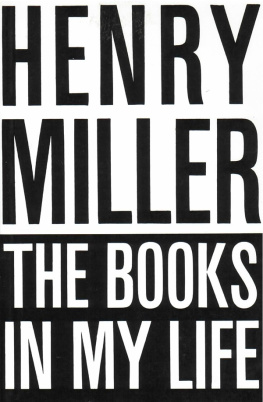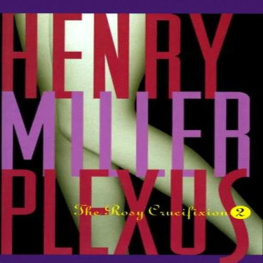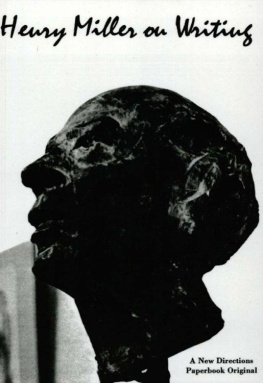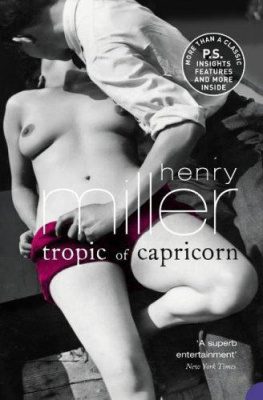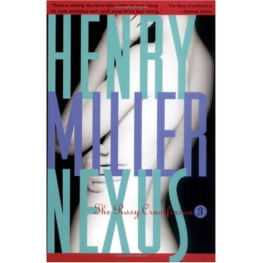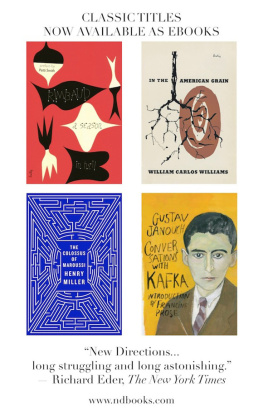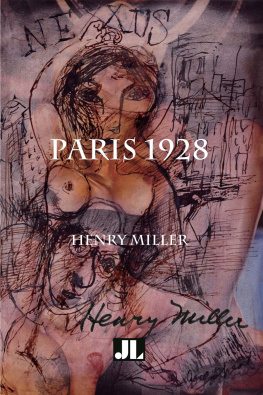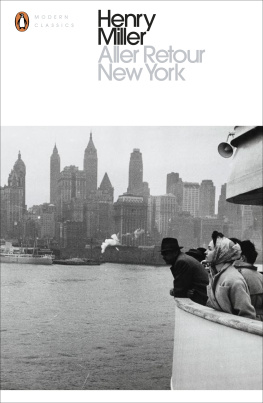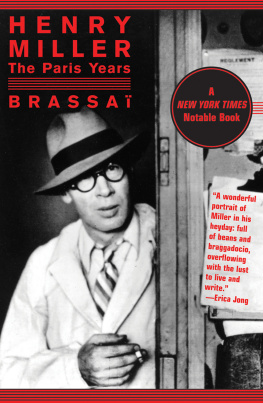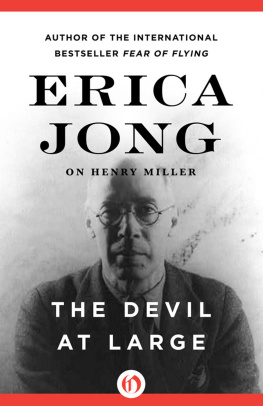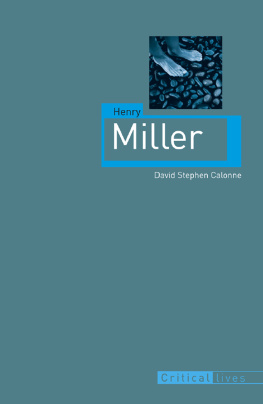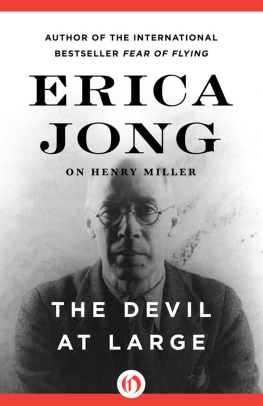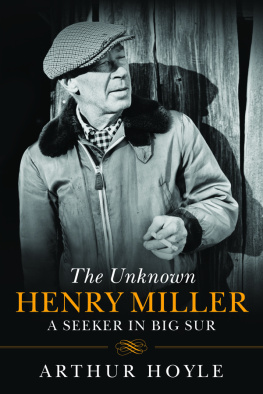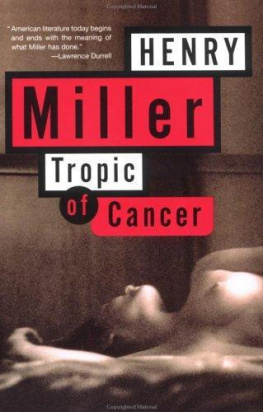All I have written now appears to me as so much straw.
When the artist has exhausted his materials, when the fancy no longer paints, when thoughts are no longer apprehended, and books are a wearinesshe has always the resource to live.
All is marvellous for the poet, all is divine for the saint, all is great for the hero; all is wretched, miserable, ugly and bad for the base and sordid soul.
Probably, even in our time, an artist might find his imagination considerably stimulated and his work powerfully improved if he knew that anything short of his best would bring him to the gallows, with or without trial by jury
Aprs avoir pris un an de vacances (15 sept. 4915 sept. 50), me marier, un peu voyager en Suisse, Luxembourg, Hollande, Angleterre, Belgique, soigner mes yeux, faire trois mois de radio, dmnager, me rinstaller Parisje me suis remis au travail, hlas! Petit petit je vais menfoncer dans cet univers qui contient tous les autres comme une goutte deau des myriades de microbes, la goutte dencre qui coule de la plume Cest extraordinaire et je narrive pas my habituer ni y croire!
(B LAISE C ENDRARS in a letter dated Sept. 16, 1950.)
PREFACE
T HE purpose of this book, which will run to several volumes in the course of the next few years, is to round out the story of my life. It deals with books as vital experience. It is not a critical study nor does it contain a program for self-education.
One of the results of this self-examinationfor that is what the writing of this book amounts tois the confirmed belief that one should read less and less, not more and more. As a glance at the Appendix will reveal, I have not read nearly as much as the scholar, the bookworm, or even the well-educated manyet I have undoubtedly read a hundred times more than I should have read for my own good. Only one out of five in America, it is said, are readers of books. But even this small number read far too much. Scarcely any one lives wisely or fully.
There have been and always will be books which are truly revolutionarythat is to say, inspired and inspiring. They are few and far between, of course. One is lucky to run across a handful in a lifetime. Moreover, these are not the books which invade the general public. They are the hidden reservoirs which feed the men of lesser talent who know how to appeal to the man in the street. The vast body of literature, in every domain, is composed of hand-me-down ideas. The questionnever resolved, alas!is to what extent it would be efficacious to curtail the overwhelming supply of cheap fodder. One thing is certain todaythe illiterate are definitely not the least intelligent among us.
If it be knowledge or wisdom one is seeking, then one had better go direct to the source. And the source is not the scholar or philosopher, not the master, saint, or teacher, but life itselfdirect experience of life. The same is true for art. Here, too, we can dispense with the masters. When I say life I have in mind, to be sure, another kind of life than that we know today. I have in mind the sort which D. H. Lawrence speaks of in Etruscan Places.Or that Henry Adams speaks of when the Virgin reigned supreme at Chartres.
In this age, which believes that there is a short cut to everything, the greatest lesson to be learned is that the most difficult way is, in the long run, the easiest. All that is set forth in books, all that seems so terribly vital and significant, is but an iota of that from which it stems and which it is within everyones power to tap. Our whole theory of education is based on the absurd notion that we must learn to swim on land before tackling the water. It applies to the pursuit of the arts as well as to the pursuit of knowledge. Men are still being taught to create by studying other mens works or by making plans and sketches never intended to materialize. The art of writing is taught in the classroom instead of in the thick of life. Students are still being handed models which are supposed to fit all temperaments, all kinds of intelligence. No wonder we produce better engineers than writers, better industrial experts than painters.
My encounters with books I regard very much as my encounters with other phenomena of life or thought. All encounters are configurate, not isolate. In this sense, and in this sense only, books are as much a part of life as trees, stars or dung. I have no reverence for them per se. Nor do I put authors in any special, privileged category. They are like other men, no better, no worse. They exploit the powers given them, just as any other order of human being. If I defend them now and thenas a classit is because I believe that, in our society at least, they have never achieved the status and the consideration they merit. The great ones, especially, have almost always been treated as scapegoats.
To see myself as the reader I once was is like watching a man fighting his way through a jungle. To be sure, living in the heart of the jungle I learned a few things about the jungle. But my aim was never to live in the jungleit was to get clear of it! It is my firm conviction that it is not necessary to first inhabit this jungle of books. Life itself is enough of a junglea very real and a very instructive one, to say the least. But, you ask, may not books be a help, a guide, in fighting our way through the wilderness? Nira pas loin, said Napoleon, celui qui sait davance o il veut aller.
The principal aim underlying this work is to render homage where homage is due, a task which I know beforehand is impossible of accomplishment. Were I to do it properly, I would have to get down on my knees and thank each blade of grass for rearing its head. What chiefly motivates me in this vain task is the fact that in general we know all too little about the influences which shape a writers life and work. The critic, in his pompous conceit and arrogance, distorts the true picture beyond all recognition. The author, however truthful he may think himself to be, inevitably disguises the picture. The psychologist, with his single-track view of things, only deepens the blur. As author, I do not think myself an exception to the rule. I, too, am guilty of altering, distorting and disguising the factsif facts there be. My conscious effort, however, has beenperhaps to a faultin the opposite direction. I am on the side of revelation, if not always on the side of beauty, truth, wisdom, harmony and ever-evolving perfection. In this work I am throwing out fresh data, to be judged and analyzed, or accepted and enjoyed for enjoyments sake. Naturally I cannot write about

